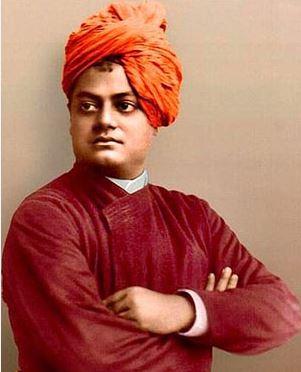Swami Vivekananda

Swami Vivekananda (1863–1902) was an Indian philosopher, yoga master, and spiritual teacher who became known worldwide and had a significant influence on the spread of Vedanta philosophy and yoga in the West. He played a pivotal role in awakening Indian national consciousness and spiritual renewal by combining the profound teachings of Hinduism with a modernized perspective and universal appeal.
Early Life and Education:
Swami Vivekananda was born Narendranath Datta on January 12, 1863, in Calcutta (now Kolkata). He grew up in a wealthy family and, from a young age, showed an exceptional interest in spirituality and philosophy. He was particularly fascinated by Hinduism and the teachings of Vedanta. During his studies at the University of Calcutta, he studied Western philosophy, Western science, and classical Indian texts, including the Bhagavad Gita and the Upanishads.
Encounter with Ramakrishna:
A crucial turning point in Vivekananda's life was his encounter with the mystic teacher Ramakrishna Paramahamsa. Ramakrishna had a profound spiritual experience and imparted to Vivekananda a direct, living experience of the divine and the importance of pragmatic yoga and holistic spirituality. Ramakrishna taught him that all religions have different paths leading to the same divine goal. This universal perspective deeply influenced Vivekananda and continues to shape his philosophy to this day.
Introduction of Yoga to the West:
Vivekananda is best known for introducing yoga and Vedanta philosophy to the West. His trip to Chicago for the World Parliament of Religions in 1893 was a historic moment. There, he delivered his famous speech, which began with the words: "Sisters and brothers of America." These words won him immediate sympathy and recognition, and the speech highlighted the legacy of universal tolerance and the diversity of religions.
Vivekananda advocated for the acceptance of all religions and the importance of practicing yoga. He emphasized the need for people to discover their own inner strength to experience true spiritual enlightenment. This idea contributed to the popularity of yoga and Indian spirituality in the West.
Teachings and Philosophy:
Vedanta and Universalism: Vivekananda was a great follower of Vedanta philosophy, which emphasizes the teachings of the Upanishads and the vision of Brahman as the highest, indivisible, and universal principle. According to him, the true self of man, the Atman, is identical with Brahman, and the path to enlightenment leads through self-knowledge.
He believed that all religions are ultimately different expressions of the one divine principle. This made him a passionate advocate of interreligious dialogue and tolerance.
Self-realization and service to humanity: A central teaching of Vivekananda was self-realization (knowledge of one's true self) and the importance of service to humanity. He taught that true spirituality lies not merely in contemplation or meditation, but in service to one's fellow human beings, especially the poor and disadvantaged. This led to his concept of an active spirituality manifested in social and spiritual initiatives.
Yoga: Vivekananda popularized the various paths of yoga (such as bhakti, karma, jnana, and raja yoga), with particular emphasis on raja yoga. He described yoga as a practical path to self-realization that encompasses meditation and control of the mind.
Strengthening Indian national consciousness: Vivekananda placed great emphasis on Indian culture and spiritual traditions, particularly in response to Western colonial rule and criticism of "backward" India. He saw India as a nation with a long spiritual and philosophical tradition that needed to be preserved and integrated into the modern world. His vision included promoting spiritual and social reforms and promoting India's cultural heritage.
Pragmatism and Science: Vivekananda was also a proponent of science, emphasizing that true spirituality can be reconciled with scientific knowledge and a practical approach. In his teachings, he criticized the separation between science and spirituality and advocated that the two fields complement each other.
Vivekananda and the Ramakrishna Mission:
After Ramakrishna's death in 1886, Vivekananda took over the leadership of the Ramakrishna Mission, a religious organization founded in 1897 to continue Ramakrishna's work. This mission is involved in areas such as education, welfare, and nursing and works for the prosperity and spiritual growth of society.
Influence and Legacy:
Swami Vivekananda left a profound and lasting legacy. He is revered not only as a spiritual leader, but also as a champion of social reform and a champion of the rights and welfare of the poor. His philosophy, which emphasizes the union of spiritual practices with social responsibility, has inspired many people and is leading to positive change in various parts of the world.
Vivekananda's works, including his lectures, writings, and books, such as the famous "Raja Yoga," remain a source of inspiration and spiritual wisdom even today.
Summary:
Swami Vivekananda was an outstanding spiritual teacher who popularized Hinduism, yoga, and Vedanta philosophy worldwide. Through his teachings on self-realization, universal tolerance, and social activism, he had a profound influence on the spiritual and social scene of the 19th and 20th centuries. His speech in Chicago in 1893 emphasized the union of religion and science and the importance of spirituality in daily life, making him a leading advocate of the spiritual renewal of India and the world.

